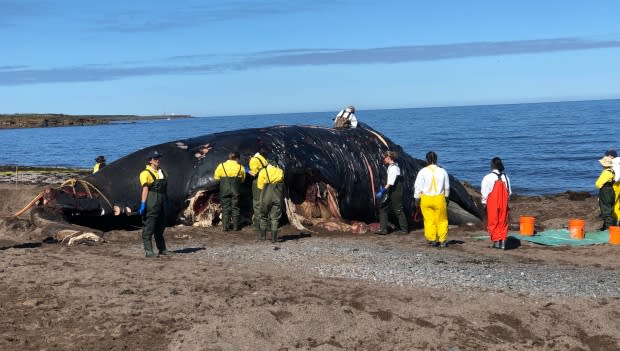Researchers 'disappointed' after 2 more right whales found dead in Gulf of St. Lawrence
It's another devastating week for scientists working to protect the endangered North Atlantic right whale, after two more whales were found floating dead in the Gulf of St. Lawrence on Tuesday.
The recent deaths bring the total to four confirmed North Atlantic right whale deaths in Canadian waters this year.
"It is incredibly difficult to lose so many animals in such a short amount of time from a population that is so endangered," said Kim Davies, an oceanographer and assistant professor at the University of New Brunswick in Saint John.
"We have to keep focus on the animals that are still alive."
The two dead whales were discovered off the Acadian Peninsula in northeastern New Brunswick.
Whales not found in the same area
So far, Davies said the animals have been found in areas where there is a lot of human activity, such as shipping and the snow crab fishery.
"This year has been a curious year so far," she said.
"The animals have not been concentrated in the same area as they have been in previous years."
That's because the whales are following a food source that's drifting in the ocean current, making it difficult to predict where they're going to be.
What do scientists do now?
In the meantime, she said researchers need to continue to monitor the animals over the next two months when they are in the region.
She said there will be research teams doing vessel surveys this summer across the region. There will also be aerial surveillance done by Canadian and U.S. governments.
"We have to keep measuring the animals, measuring the risks [and try] to figure out exactly what's going on," she said.
Researchers still don't know what caused the deaths of these four animals.
But Davies said significantly reducing entanglements and ship strikes so the animals will recover, is crucial.
Deaths of Punctuation and Wolverine
Last week, a right whale, known as Punctuation, was spotted floating dead in the Gulf of St. Lawrence during a Transport Canada surveillance flight. The whale underwent a necropsy in Cape Breton on Tuesday but it will take several months before final results are compiled.
Scientists had observed Punctuation for four decades. In that time, she had eight calves. Two of those calves went on to have calves of their own.
Researchers have said Punctuation had been entangled in fishing nets five times and struck by ships twice in her lifetime.
Another carcass of a right whale, known as Wolverine, was discovered on June 4. The animal was towed to Miscou Island, where a necropsy was done.

An assessment came back inconclusive, but officials with Fisheries and Oceans Canada said the death did not appear to be caused by a vessel strike or entanglement in fishing gear.
The recent deaths are a reminder of the summer of 2017, "where a number of whales died in a short period of time without explanation," Davies said.

"It is a sad day anytime one of them dies of course, especially when they die in such horrific circumstances," she said.
"As for example, a fishing gear entanglement, which can be a very painful, torturous process."
Sticking to the science
There are an estimated 414 North Atlantic right whales left worldwide.
No right whales were recorded dying in Canadian waters in 2018 but 12 were found dead in the Gulf of St. Lawrence in 2017.
Necropsies on seven of those whales found four died from trauma consistent with vessel collisions, while two deaths were the result of entanglement in fishing gear.
The federal government eased restrictions aimed at protecting North Atlantic right whales this year based on data from 2018.
"We have to keep our mind on the science and the research, and making sure we're collecting the information that is needed by all parties in order to make positive change for these animals," Davies said.
The Department of Fisheries and Oceans says it's working with marine mammal response partners to identify next steps and will release more information once it becomes available.


